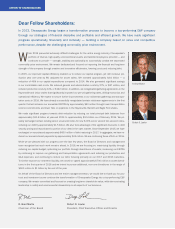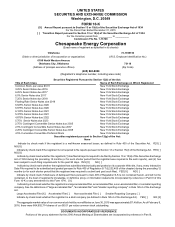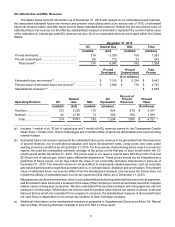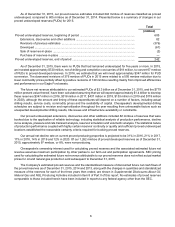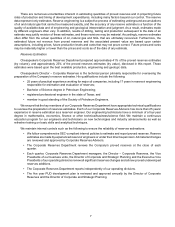Chesapeake Energy 2015 Annual Report Download - page 11
Download and view the complete annual report
Please find page 11 of the 2015 Chesapeake Energy annual report below. You can navigate through the pages in the report by either clicking on the pages listed below, or by using the keyword search tool below to find specific information within the annual report.7
There are numerous uncertainties inherent in estimating quantities of proved reserves and in projecting future
rates of production and timing of development expenditures, including many factors beyond our control. The reserve
data represent only estimates. Reserve engineering is a subjective process of estimating underground accumulations
of oil and natural gas that cannot be measured exactly, and the accuracy of any reserve estimate is a function of the
quality of available data and of engineering and geological interpretation and judgment. As a result, estimates made
by different engineers often vary. In addition, results of drilling, testing and production subsequent to the date of an
estimate may justify revision of these estimates, and these revisions may be material. Accordingly, reserve estimates
often differ from the actual quantities of oil, natural gas and NGL that are ultimately recovered. Furthermore, the
estimated future net revenue from proved reserves and the associated present value are based upon certain
assumptions, including prices, future production levels and costs that may not prove correct. Future prices and costs
may be materially higher or lower than the prices and costs as of the date of any estimate.
Reserves Estimation
Chesapeake's Corporate Reserves Department prepared approximately 41% of the proved reserves estimates
(by volume), and approximately 23% of the proved reserves estimates (by value), disclosed in this report. Those
estimates were based upon the best available production, engineering and geologic data.
Chesapeake's Director – Corporate Reserves is the technical person primarily responsible for overseeing the
preparation of the Company's reserve estimates. His qualifications include the following:
• 25 years of practical experience working for major oil companies, including 17 years in reservoir engineering
responsible for estimation and evaluation of reserves;
• Bachelor of Science degree in Petroleum Engineering;
• registered professional engineer in the state of Texas; and
• member in good standing of the Society of Petroleum Engineers.
We ensure that the key members of our Corporate Reserves Department have appropriate technical qualifications
to oversee the preparation of reserves estimates. Each of our Corporate Reserves Advisors has more than 25 years’
experience in reserve estimation as a reservoir engineer. Our engineering technicians have a minimum of a four-year
degree in mathematics, economics, finance or other technical/business/science field. We maintain a continuous
education program for our engineers and technicians on new technologies and industry advancements as well as
refresher training on basic skills and analytical techniques.
We maintain internal controls such as the following to ensure the reliability of reserves estimations:
• We follow comprehensive SEC-compliant internal policies to estimate and report proved reserves. Reserve
estimates are made by experienced reservoir engineers or under their direct supervision. All material changes
are reviewed and approved by Corporate Reserves Advisors.
• The Corporate Reserves Department reviews the Company's proved reserves at the close of each
quarter.
• Each quarter, Corporate Reserves Department managers, the Director – Corporate Reserves, the Vice
Presidents of our business units, the Director of Corporate and Strategic Planning and the Executive Vice
Presidents of our operating divisions review all significant reserves changes and all new proved undeveloped
reserves additions.
• The Corporate Reserves Department reports independently of our operating divisions.
• The five year PUD development plan is reviewed and approved annually by the Director of Corporate
Reserves and the Director of Corporate and Strategic Planning.


